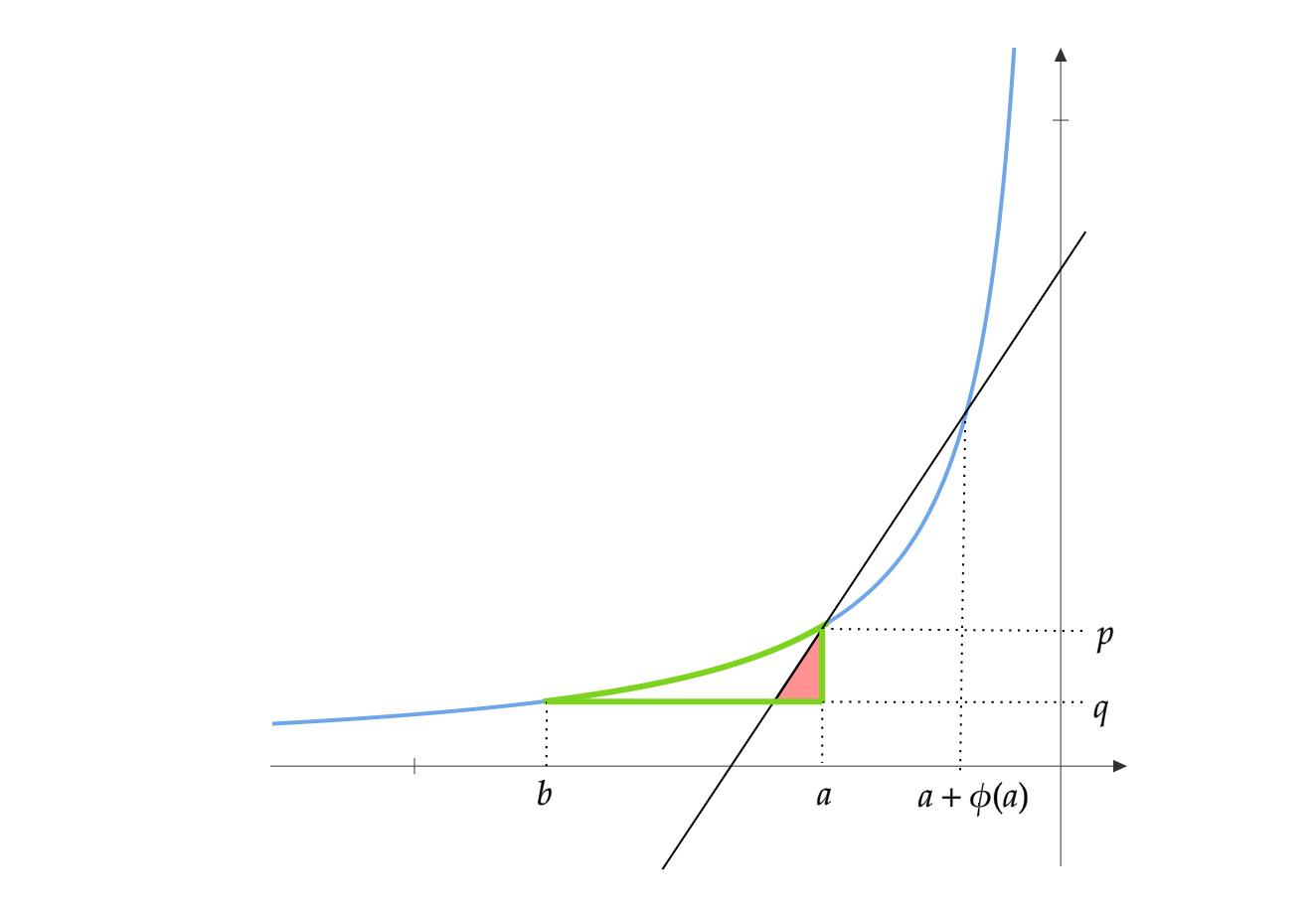Online Mirror Descent using Potentials
Let \(\psi\) be a potential and \(f\) be the associated function. Define \(F(x)=\sum_{i=1}^n f(x_i)\). Define the Bregman Divergence as :
\[\text{Breg}(x\|y) = F(x) - F(y) - \nabla F(y)^\top (x-y)\]1 step OMD
Consider the Online Mirror Descent(OMD) algorithm on the simplex \(\Delta_n\) with regularizer \(F(x)\). Assume the losses are linear. The 1-step OMD update is written as:
\[\begin{align*} x_1 &= \arg\min_{x \in \Delta_n} F(x)\\ x_{t+1} &= \arg\min_{x \in \Delta_n} \left[\eta_t l_t^\top x + \text{Breg}(x\|x_t)\right] \end{align*}\]Solving the minimization above and using facts about potential functions along with induction, we can show that:
\[\begin{align*} x_1 &= \psi(\lambda(0)) = (1/n,\dots,1/n)\\ x_{t+1} &= \psi(\theta_t + \lambda(\theta_t)) \quad \text{ where } \quad \theta_t = - \sum_{s=1}^t \eta_s l_s \end{align*}\]So, OMD can be written as:
- Let \(\theta_0=0\)
- For \(t=1 \dots T\)
- Play \(x_t = \psi(\theta_{t-1} + \lambda(\theta_{t-1}))\)
- Observe \(l_t\)
- Update \(\theta_t = \theta_{t-1} - \eta_t l_t\)
2 step OMD
Sometimes, one can write OMD using a two step update:
\[\begin{align*} x_1 &= \arg\min_{x \in \Delta_n} F(x)\\ \tilde{x}_{t+1} &= \arg\min_{x \in \mathbb{R}_n} \left[\eta_t l_t^\top x + \text{Breg}(x\|x_t)\right]\\ x_{t+1} &= \arg\min_{x \in \Delta_n} \text{Breg}(x\|\tilde{x}_{t+1}) \end{align*}\]Solving the minimization above we can show that:
\[\begin{align*} x_1 &= \psi(\lambda(0)) = (1/n,\dots,1/n)\\ \tilde{x}_{t+1} &= \psi(\theta_t + \lambda(\theta_{t-1}))\\ x_{t+1} &= \psi(\theta_t + \lambda(\theta_t)) \quad \text{ where } \quad \theta_t = - \sum_{s=1}^t \eta_s l_s \end{align*}\]The 2 step OMD is valid if \(\tilde{x}_{t+1}\) exists. Also, note that \(\tilde{x}_{t+1}\) may not belong to the simplex.
Regret Inequality
Using potentials, obtaining the regret inequality for OMD is considerably easier compared to previous techniques.
1 step OMD
For any \(x \in \Delta_n\), we have:
\[\begin{align*} l_t^\top(x_t-x) &= l_t^\top(x_{t+1}-x) + l_t^\top(x_t-x_{t+1})\\ &= \frac{1}{\eta_t}(\theta_{t-1}-\theta_t)^\top(x_{t+1}-x) + l_t^\top(x_t-x_{t+1})\\ &= \left(\frac{\nabla F(x_t)-\lambda(\theta_{t-1})}{\eta_t} - \frac{\nabla F(x_{t+1})-\lambda(\theta_t)}{\eta_t}\right)^\top(x_{t+1}-x) + l_t^\top(x_t-x_{t+1})\\ &= \left(\frac{\nabla F(x_t)}{\eta_t} - \frac{\nabla F(x_{t+1})}{\eta_t}\right)^\top(x_{t+1}-x) + l_t^\top(x_t-x_{t+1}) \end{align*}\]We can write the first term as:
\[\begin{align*} \left(\nabla F(x_t) - \nabla F(x_{t+1})\right)^\top(x_{t+1}-x) &= \text{Breg}(x\|x_{t}) - \text{Breg}(x\|x_{t+1}) - \text{Breg}(x_{t+1}\|x_{t}) \end{align*}\]Taking summation over \(t\), we have:
\[\begin{align*} \sum_{t=1}^T l_t^\top(x_t-x) &= \sum_{t=1}^T \frac{1}{\eta_t}\left[ \text{Breg}(x\|x_{t}) - \text{Breg}(x\|x_{t+1}) \right] + \sum_{t=1}^T \left[ l_t^\top(x_t-x_{t+1}) - \frac{1}{\eta_t}\text{Breg}(x_{t+1}\|x_{t}) \right]\\ \end{align*}\]Specific Results:
-
Constant learning rate \(\eta_t=\eta\). We can see that the first term telescopes:
\[\begin{align*} \sum_{t=1}^T l_t^\top(x_t-x) &= \frac{1}{\eta} \left[\text{Breg}(x\|x_1) - \text{Breg}(x\|x_{T+1}) \right] + \sum_{t=1}^T \left[ l_t^\top(x_t-x_{t+1}) - \frac{1}{\eta}\text{Breg}(x_{t+1}\|x_{t}) \right]\\ &\leq \frac{1}{\eta} \text{Breg}(x\|x_1) + \sum_{t=1}^T \left[ l_t^\top(x_t-x_{t+1}) - \frac{1}{\eta}\text{Breg}(x_{t+1}\|x_{t}) \right] \end{align*}\] -
Non-increasing learning rate \(\eta_t\geq \eta_{t+1}\) and \(\sup_{1\leq t\leq T}\text{Breg}(x\|x_t) < D\). We have:
\[\begin{align*} \sum_{t=1}^T l_t^\top(x_t-x) &\leq \frac{1}{\eta_1} \text{Breg}(x\|x_1) + \sum_{t=2}^{T} \text{Breg}(x\|x_{t})\left(\frac{1}{\eta_{t}} - \frac{1}{\eta_{t-1}}\right) + \sum_{t=1}^T \left[ l_t^\top(x_t-x_{t+1}) - \frac{1}{\eta_t}\text{Breg}(x_{t+1}\|x_{t}) \right]\\ &\leq \frac{1}{\eta_T} D + \sum_{t=1}^T \left[ l_t^\top(x_t-x_{t+1}) - \frac{1}{\eta_t}\text{Breg}(x_{t+1}\|x_{t}) \right] \end{align*}\] -
Non-decreasing learning rate \(\eta_t\leq \eta_{t+1}\). We have:
\[\begin{align*} \sum_{t=1}^T l_t^\top(x_t-x) &\leq \frac{1}{\eta_1} \text{Breg}(x\|x_1) + \sum_{t=2}^{T} \text{Breg}(x\|x_{t})\left(\frac{1}{\eta_{t}} - \frac{1}{\eta_{t-1}}\right) + \sum_{t=1}^T \left[ l_t^\top(x_t-x_{t+1}) - \frac{1}{\eta_t}\text{Breg}(x_{t+1}\|x_{t}) \right]\\ &\leq \frac{1}{\eta_1} \text{Breg}(x\|x_1) + \sum_{t=1}^T \left[ l_t^\top(x_t-x_{t+1}) - \frac{1}{\eta_t}\text{Breg}(x_{t+1}\|x_{t}) \right] \end{align*}\]
2-step OMD
For any \(x \in \Delta_n\), we have:
\[\begin{align*} l_t^\top(x_t-x) &= l_t^\top(\tilde{x}_{t+1}-x) + l_t^\top(x_t-\tilde{x}_{t+1})\\ &= \frac{1}{\eta_t}(\theta_{t-1}-\theta_t)^\top(\tilde{x}_{t+1}-x) + l_t^\top(x_t-\tilde{x}_{t+1})\\ &= \left(\frac{\nabla F(x_t)-\lambda(\theta_{t-1})}{\eta_t} - \frac{\nabla F(\tilde{x}_{t+1})-\lambda(\theta_{t-1})}{\eta_t}\right)^\top(\tilde{x}_{t+1}-x) + l_t^\top(x_t-\tilde{x}_{t+1})\\ &= \left(\frac{\nabla F(x_t)}{\eta_t} - \frac{\nabla F(\tilde{x}_{t+1})}{\eta_t}\right)^\top(\tilde{x}_{t+1}-x) + l_t^\top(x_t-\tilde{x}_{t+1}) \end{align*}\]We can write the first term as:
\[\begin{align*} \left(\nabla F(x_t) - \nabla F(\tilde{x}_{t+1})\right)^\top(\tilde{x}_{t+1}-x) &= \text{Breg}(x\|x_{t}) - \text{Breg}(x\|\tilde{x}_{t+1}) - \text{Breg}(\tilde{x}_{t+1}\|x_{t})\\ &\leq \text{Breg}(x\|x_{t}) - \text{Breg}(x\|x_{t+1}) - \text{Breg}(\tilde{x}_{t+1}\|x_{t})\\ \end{align*}\]Note that \(\text{Breg}(x\|x_{t+1}) \leq \text{Breg}(x\|\tilde{x}_{t+1})\) for all \(x \in \Delta_n\).
\[\begin{align*} \text{Breg}(x\|\tilde{x}_{t+1}) - \text{Breg}(x\|x_{t+1}) &= F(x_{t+1}) - F(\tilde{x}_{t+1}) - \nabla F(\tilde{x}_{t+1})^\top (x-\tilde{x}_{t+1}) + \nabla F(x_{t+1})^\top (x-x_{t+1}) \\ &= \text{Breg}(x_{t+1}\| \tilde{x}_{t+1}) + ( \nabla F(x_{t+1}) - \nabla F(\tilde{x}_{t+1}))^\top (x-x_{t+1}) \\ &\geq ( \nabla F(x_{t+1}) - \nabla F(\tilde{x}_{t+1}))^\top (x-x_{t+1})\\ &= (\theta_t + \lambda(\theta_t) - \theta_t - \lambda(\theta_{t-1}))^\top (x-x_{t+1})=0 \end{align*}\]Taking summation over \(t\), we have:
\[\begin{align*} \sum_{t=1}^T l_t^\top(x_t-x) &\leq \sum_{t=1}^T \frac{1}{\eta_t}\left[ \text{Breg}(x\|x_{t}) - \text{Breg}(x\|x_{t+1}) \right] + \sum_{t=1}^T \left[ l_t^\top(x_t-\tilde{x}_{t+1}) - \frac{1}{\eta_t}\text{Breg}(\tilde{x}_{t+1}\|x_{t}) \right]\\ \end{align*}\]For the three cases, we can get similar results with \(x_{t+1}\) replaced by \(\tilde{x}_{t+1}\) in the second summation.
Parts of this post appear in my paper : Putta, S. R., & Agrawal, S. (2021). Scale Free Adversarial Multi Armed Bandits. arXiv preprint arXiv:2106.04700.
